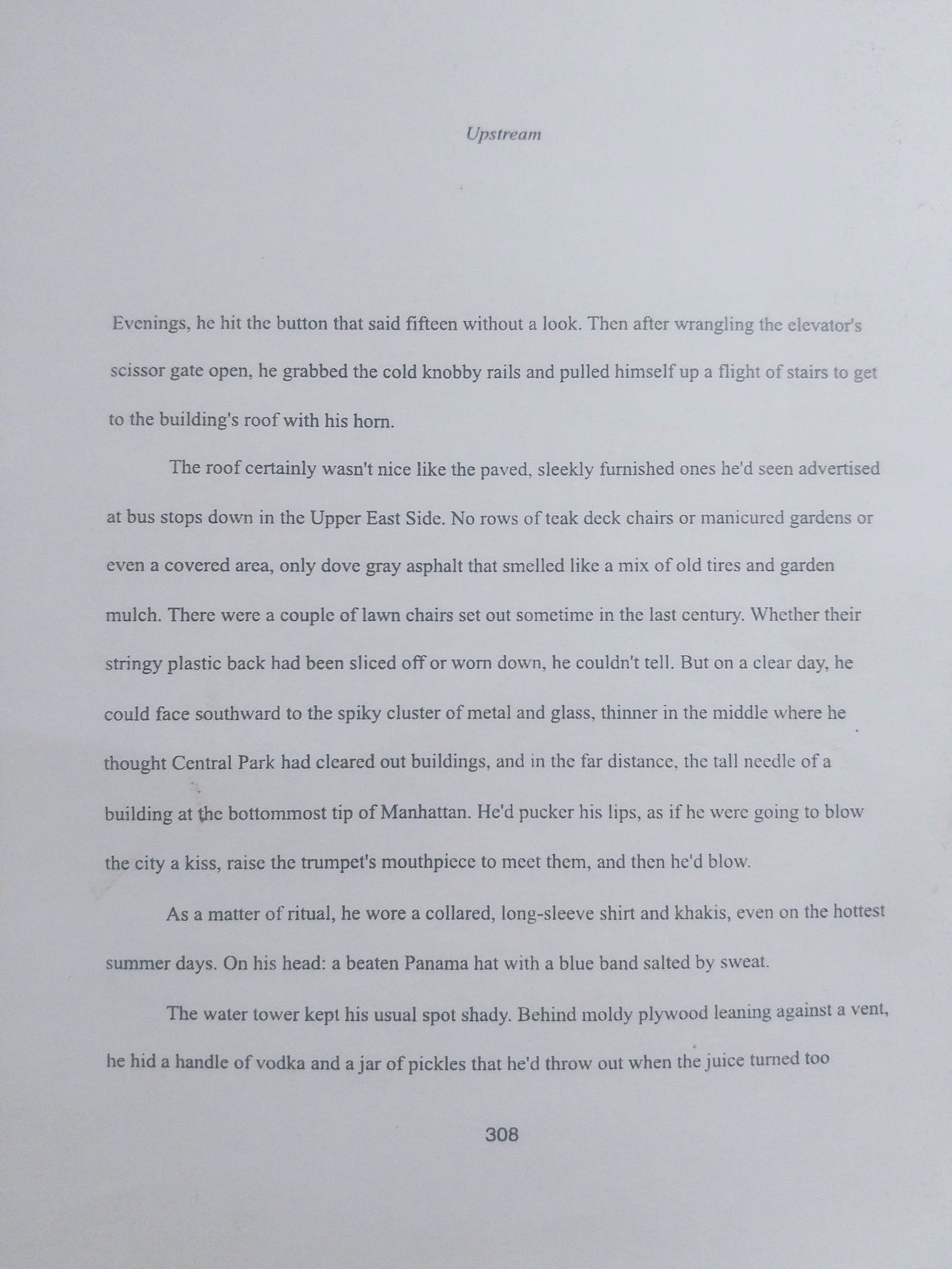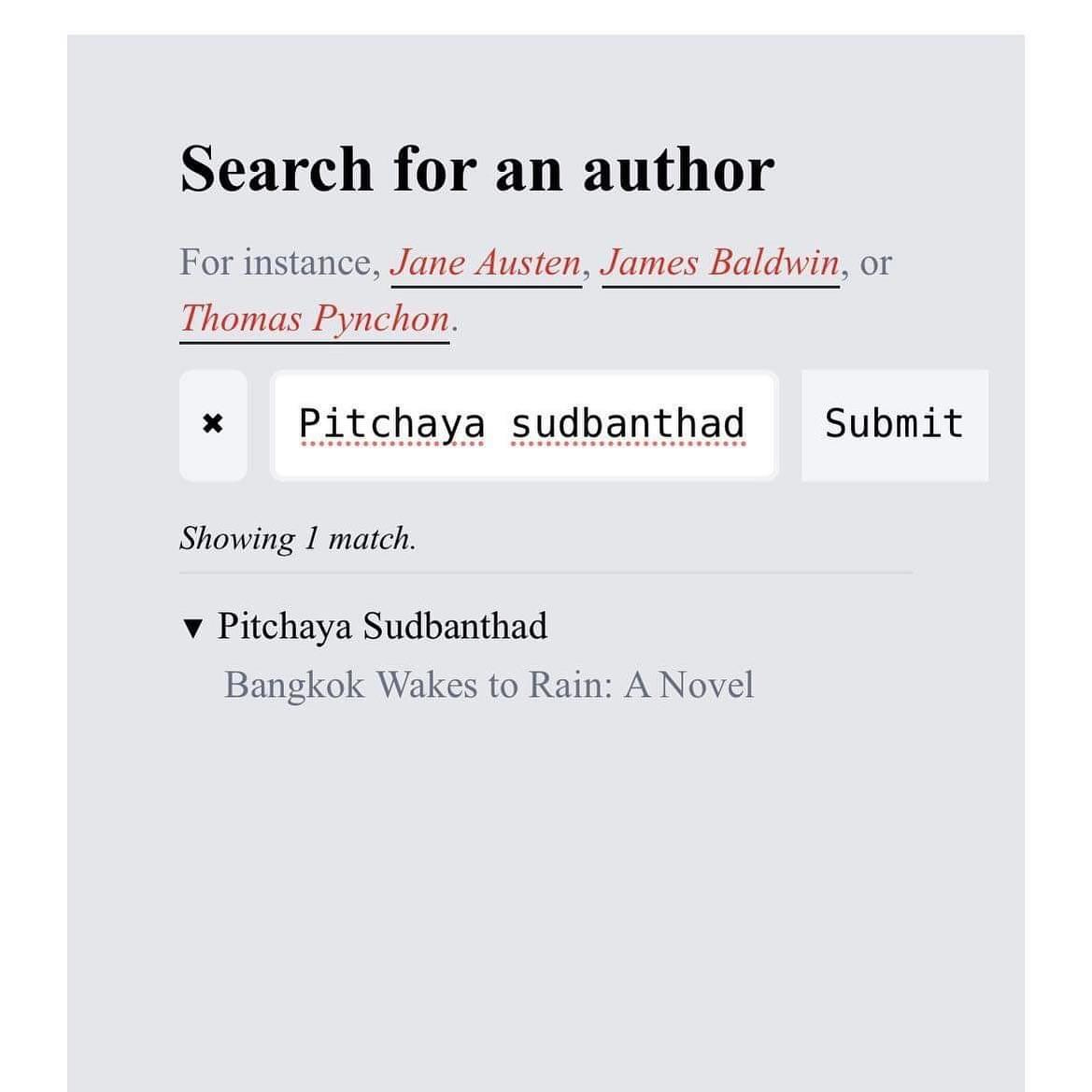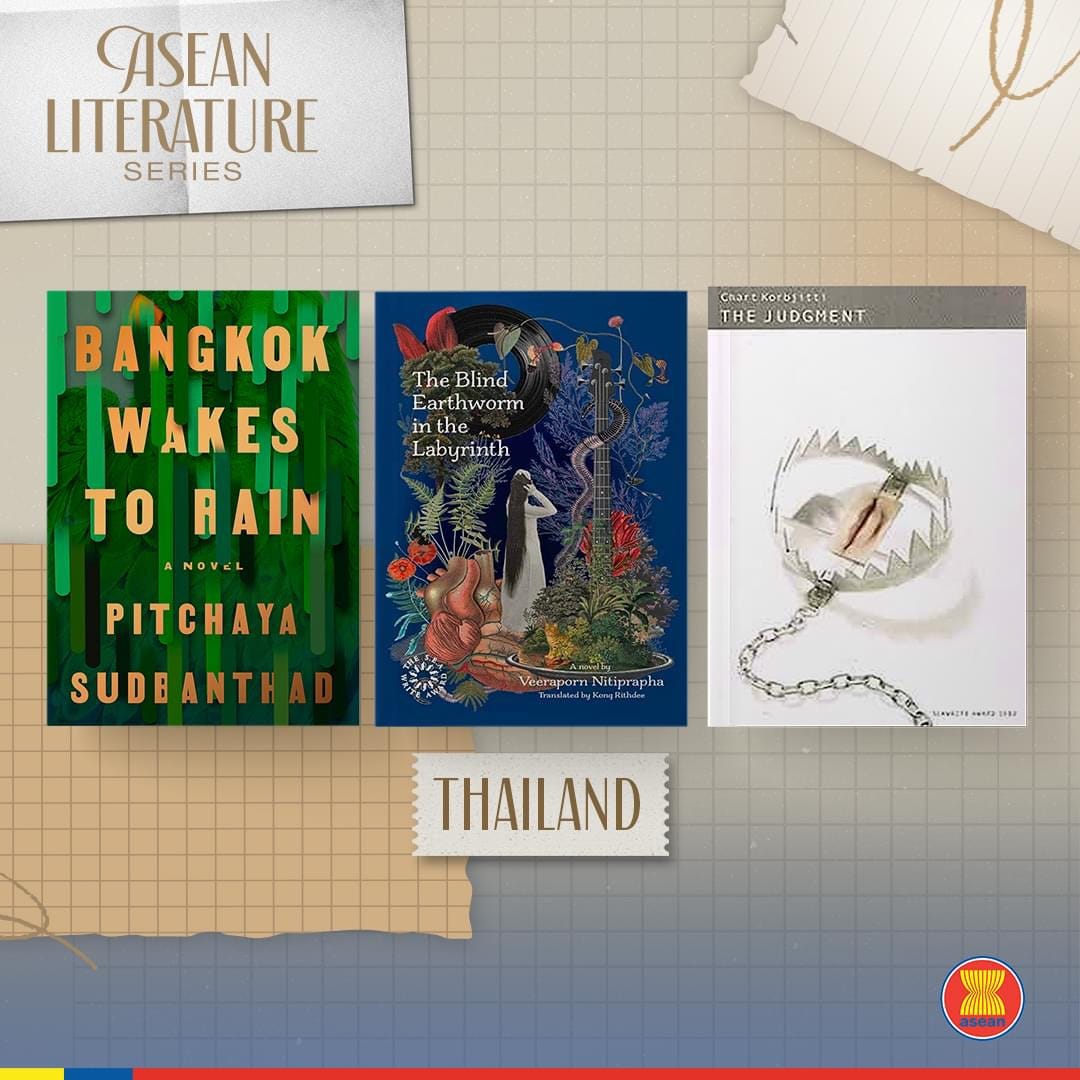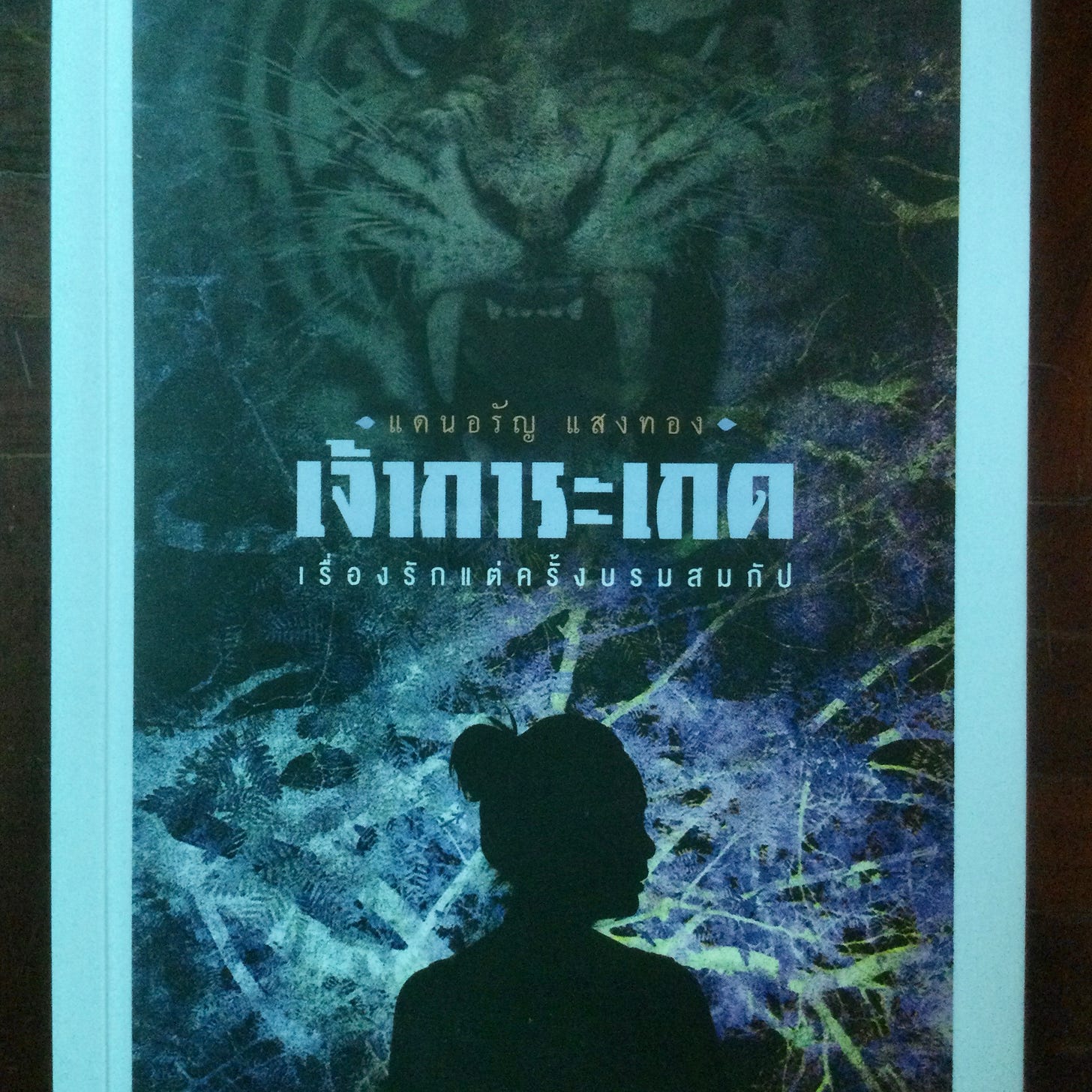I told you my newsletter would be very occasional, and I’m a keeper of promises. It appears that I’m inclined to send out one of these at the turning of seasons. It’s an instinctual reminder of time passing—long enough to warrant another contribution to the cacophony. And there’s a lot to be heard, I know, and to tap and see as well.
We live in an age in which there is increasingly little delay between seemingly any event—be it geopolitical or personal—and the consumption of its artifacts in our private, personalized 24-hour buffet, gorging on horror and grief and the kawaii of pet videos. I’m writing this communiqué now, I believe, to grant myself the privilege of a recess, and maybe it will be one for you, however brief, as well.
Pages from the Past
I was recently cleaning up the area by my printer when pages fell from a gap between storage bins. They’re from a discarded chapter in BANGKOK WAKES TO RAIN—one of the pieces taken out to achieve a more coherent landing within the book’s concluding movement.
At talks and panels, when asked about revision and process, I often talk about the greater narrative mass that must be written to get to the one that arrives to readers. With BWTR, that amounted to several tens of thousands of words over the years it took to complete the book. This particular drafted chapter was toward the end of BWTR. It veered the narrative to present-day New York City, touching on a previously mentioned character.
I also often get asked how characters in BWTR came to be. Here’s my attempt at retracing the main character in this removed chapter. Many evenings in Brooklyn, on my walk home from a freelance day job, I’d suddenly hear the blare of a saxophone about a block from my apartment. Most times, I was the only person on the street, and the music seemed to arrive from nowhere up ahead. I’d figure out that the sound didn’t come from someone’s turned-up speakers. An unseen saxophonist was practicing live in one of the apartment buildings, and that bebop was coming from an open window above. Whenever I heard it, I’d slow down my walk to listen.
I think those listening sessions helped to spur the emergence of this character, previously glimpsed in another musician’s recollection. I saw him practicing, unseen to others, on a rooftop in Uptown Manhattan, as he has done for many years, until a hot afternoon when his body fails his music.
Here’s its first page:
And here’s another, a few pages later:
As someone who can barely read music but is fascinated by musical forms and structures, as well as the lives of others in full devotion to their art, it was fun to send out my imagination in this direction. But I ultimately came to see that the chapter steered the narrative too far away from, by this point, the novel’s arterial focus on Bangkok and the characters and places therein, and threatened to create an unbalancing diversion from the larger structure. So it was pruned away.
I’m not a proponent of the popular advice “Kill your darlings.” I think it’s a line that’s recited too often, for the comfort of easy stasis and probably without much regard for that which I might call heart. I suggest instead: Keep as many of your darlings as possible, or at least persist with their vital essence. They’re the rosy flush of life on a pale page.
That chapter would be gone but not really. With my editor as a test reader of my revisions, I’d work with an outgrowth at the site of the excision. The new chapter took its predecessor’s raw imaginings and character sketches and morphed them into the later years of an already familiar musician character and a new version of companionship for him, this time with the backdrop of Bangkok’s economically tumultuous late 1990s. It was a change that I felt gave the larger narrative more cohesion, so that a novel already expansive in its reach wouldn’t entirely fall apart.
But had I killed that darling or the many darlings in those tens of thousands of excised words? I don’t think I have that power. Most gardeners (and doomed authoritarians) sooner or later realize this: You try your best to cut or dispose of anything with a will of life, and it reliably fights its way back. Same with that which novels are mere attempts to bring across the void. Everything true to you survives through its eventual shape, one way or another.
AI, Here (a transliteration of the Thai pejorative)
Like many authors, I found out that my work has been used without my consent by billion-dollar corporations to train their artificial intelligence (or as I deem it, applied statistical modeling) via a pirated dataset. I take the liberty of quoting my own social media post on this shameless thieving and its philistine goals: “Art is not a consumerist exercise for your click-to-buy sense of the world.”
I’ve joined the Author’s Guild, which, along with 17 well known authors, has filed a class action lawsuit against OpenAI. I don’t know what will come of the case. There’s a lot of uncertainty about how Fair Use might be interpreted, and the effects of any outcome will likely be far-reaching beyond writers. But supporting advocacy for the livelihood of writers is something I could at least do. We can’t win by complaining on social media alone.
There’s some cause for heartening. What the WGA has been able to collectively win for its members in pre-emptively protecting them from exploitation by AI technology has likely set a precedence for resistance. The time to rise up is now, whatever your industry or occupation. Become a neo-Luddite, before the assistive “intelligence” technologists claim to provide is unmasked as a McKinsey-implemented scheme for your profitable dehumanization.
Thai Is Lit
I was delightfully surprised to come across my novel as part of an ASEAN (Association of Southeast Asian Nations) series highlighting works from the region.—representing, as they say, with Khun Veeraporn and Khun Chart. English-language readers should also know that there’s a larger body of books that are available or forthcoming from Thai writers. For example, coming in March 2024 is Mui Poopoksakul’s translation of เจ้าการะเกด by Saneh Sangsuk. I’ve read the Thai-language original and can recommend it as a passionately told fable of humanity daring to invade the vaster wilderness, especially with Khun Mui’s thoughtful, nuanced translation to enjoy.
What I’m Reading: Strange Connections
Having written about a house in Krungthep as a locus of intersection for many lives across time, I was drawn to Jenny Erpenbeck’s Visitation. I picked up Kairos after seeing her recently talk about it at the Center for Fiction. I’m sure most of the allusions to German’s post-war history will be lost on me, but I do appreciate unlikely love as allegory, which was also why I was compelled to read Han Kang’s Greek Lessons.
The conclusions-themed final issue of Freeman’s included Sayaka Murata’s short story “Transmogrification,” wherein a middle-aged woman, feeling left behind by an unrecognizable society and in desperate need of familiar company, reconnects with a figure from her past. I went to the NYC reading for the issue at the McNally Jackson by the Seaport and then went to the tequila bar after-party and then went to the after-after-party for the remaining survivors, cabbing it to what used to be part of Chinatown. It was at a bar that, over my few decades in this city, has evolved from welcomingly desolate to crowded and maddeningly noisy. I lost track of time and was somehow still awake well into the early morning, as I—an outdated, invisible presence—entertained myself by eavesdropping. A British woman was picking up an American. “This wasn’t my intention coming here, but my place is, like, a hundred meters away.” They stumbled away together. Maybe nothing meaningful would come of their night, or maybe it’d turn out to be true love, but the best of all worlds would be, in the devious domino-nudging mind of a writer, that I’d witnessed the start of yet another all-consuming entanglement.
Lastly, For You, These Autumnal Flowers
From the Prospect Heights Community Farm
Until next time, whenever that might be.
(And a special thank you to my paid subscribers and their virtuous patience)










